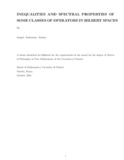| dc.description.abstract | Every normal operator is diagonalizable and every reducible operator can be expressed as a
direct sum decomposition of a normal and a pure operator. Furthermore, any two similar
operators have the same spectrum. The Putnam-Fuglede theorem implies similarity and both
the Putnam’s inequality and the Berger-Shaw inequality are measures used to conjecture how
far a given linear operator is from being normal. Boundedness of the self commutator of an
operator, also follows from these two inequalities. If the self commutator is bounded, the
operator in question becomes reducible, hence decomposable and eventually diagonalizable.
In this thesis, through normality, diagonalizability of n-Power normal, n-Power quasinormal
and that of w-hyponormal operators was investigated. In addition, three different operator
inequalities, that is, the Putnam-Fuglede theorem, the Putnam’s inequality and the Berger-
Shaw inequality, were studied for n-Power normal, n-Power quasinormal and w-hyponormal
operators.
The main tools used are such as the Lowner-Heinz inequality, the Furuta’s inequality, polar
decompositions, Aluthge decompositions, direct sum decompositions, matrix decompositions,
the kernel condition, similality and quasi-similality. | en_US |

